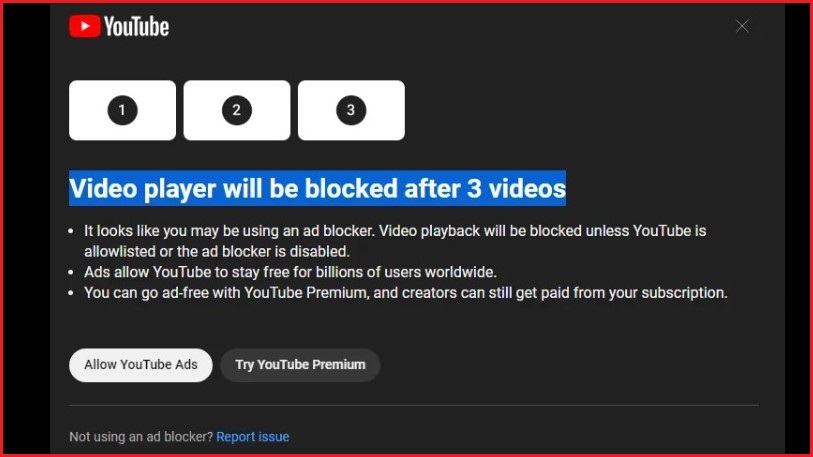Streaming giant YouTube is cracking down on ad blockers as the company warns viewers to allow ads or face the risk of videos being turned off.
Last week, Google’s parent-company Alphabet reported its earnings for the second quarter of 2023 – revealing a massive $11.46 billion (US$7.67 billion) in ad revenue from YouTube alone.
While this figure dwarfs analyst expectations based on YouTube’s $10.97 billion (US$7.34 billion) in ad earnings for the same period in 2022, the video sharing company is now taking a stronger stance against ad-blocking software on its platform – driving disgruntled users to consider picking up its ad-free premium service.
In what the company described as “a small experiment globally that urges viewers with ad blockers enabled to allow ads on YouTube or try YouTube Premium”, users started to receive notices that video playback would be blocked unless their ad blockers were disabled or configured to allow YouTube.
In a screenshot shared by Reddit user u/Reddit_n_Me, the notice warns playback would stop after three ad-blocked videos, before nudging users towards its ad-free YouTube Premium service.
YouTube said it takes disabling playback “very seriously” and assured users could offer feedback if they feel have been falsely flagged for using an ad blocker.
“Ad blocker detection is not new, and other publishers regularly ask viewers to disable ad blockers,” a YouTube spokesperson told Information Age.
The company suggested playback would be temporarily disabled only in extreme cases – specifically – when viewers repeatedly ignore requests to allow ads on YouTube.
While some users suggested they were able to continue watching content beyond the three-video mark, others said there was no workaround and levied fervent criticism at the streaming provider.
“I just cancelled YouTube premium and I suggest that you do as well. This is a money hungry company that does not listen to us customers,” said Reddit user u/Turtle2k.
Meanwhile, there have been intermittent reports of ads continuing to play on YouTube in spite of installed ad blocker extensions – particularly for popular ad blockers uBlock Origin and AdBlock.
According to The Verge, YouTube says ad blockers violate its terms of service and that it wants to it “make it easier” for viewers to “allow ads on YouTube or try YouTube Premium for an ad-free experience”.
YouTube recently implemented a price increase for YouTube Premium in the US – lifting prices $US2 to $US13.99 per month – while in Australia the price remains at $14.99 per month ($180 per year).
In May, YouTube announced the introduction of 30-second unskippable ads for viewers watching on TV – and further floated an experimental feature called “Pause Experiences” which would see ads appear when TV viewers pause a video on YouTube.
YouTube’s recent ad-integrity measures coincide with the company’s efforts to proliferate advertiser-friendly content on its platform – that is – content which abides by YouTube’s guidelines for containing inappropriate language, violence or adult content among other topics.
Late last year, the company made headlines for updates to its advertiser-friendly content guidelines which prohibited swear words within the first seven seconds of a video.
This initially prevented flagged videos from earning ad revenue, however, the company later updated this change in March to be slightly more lenient.










